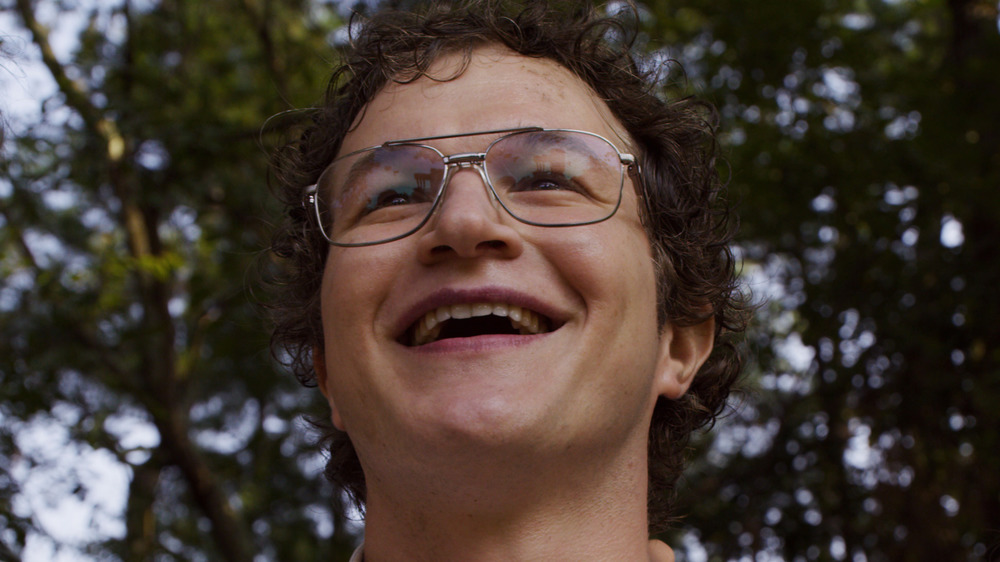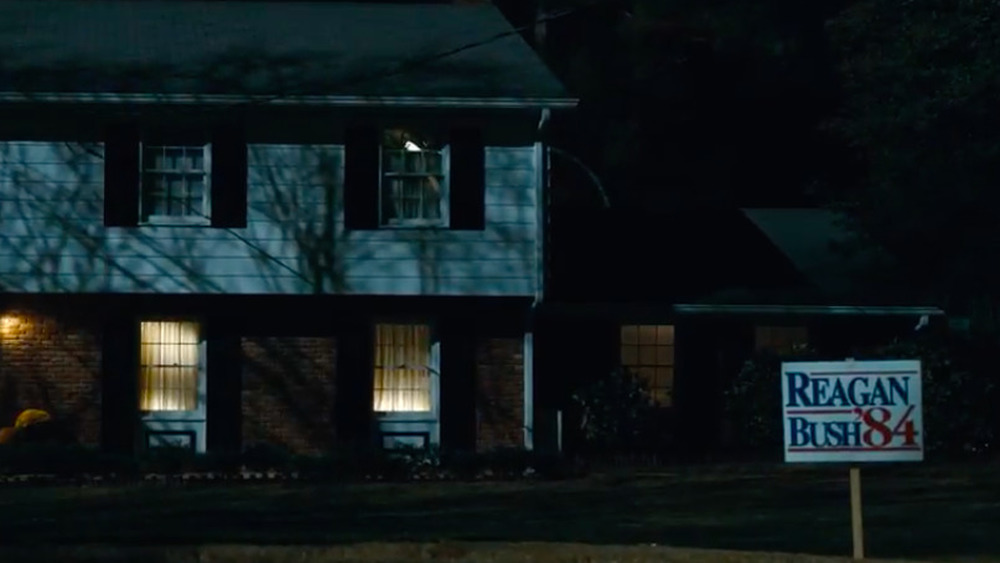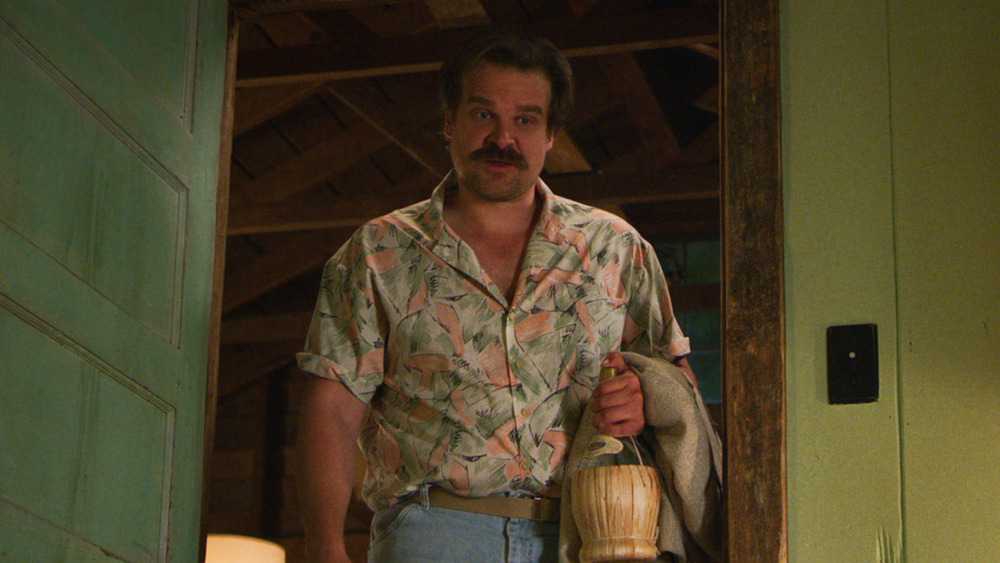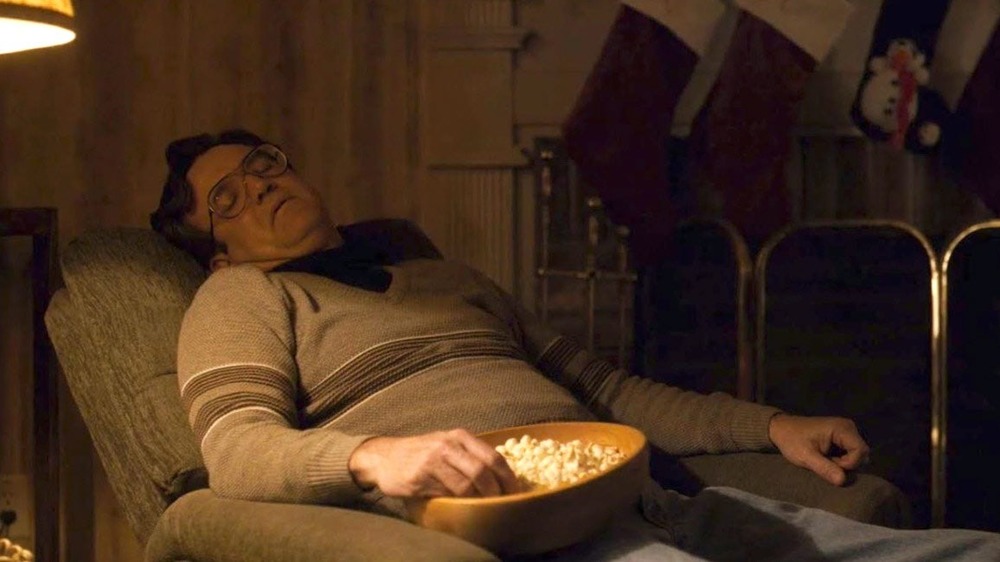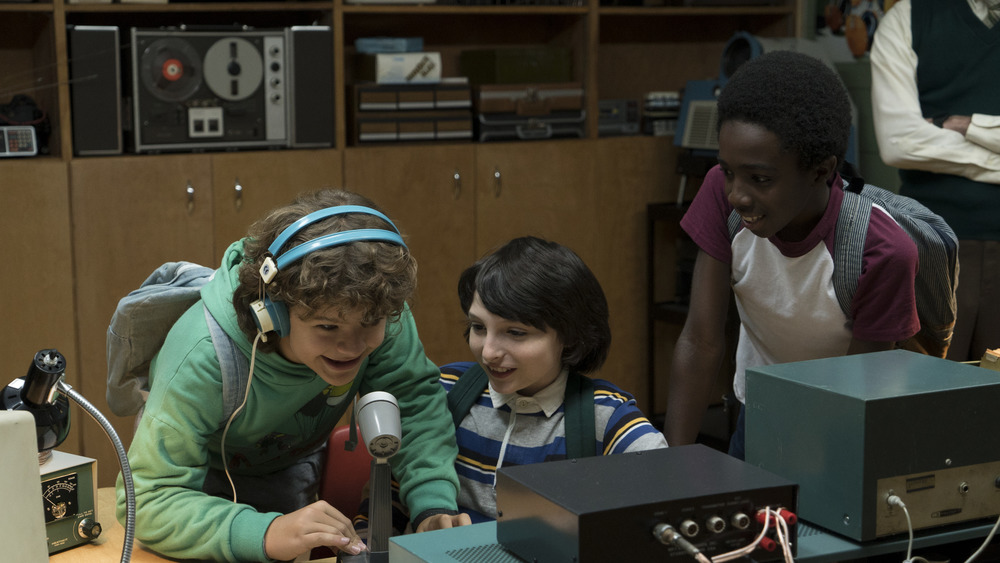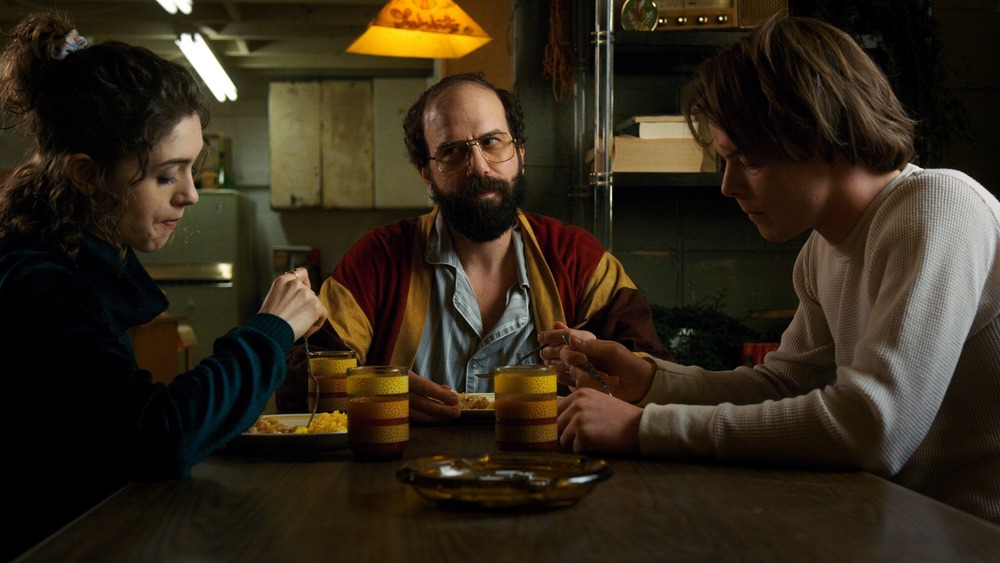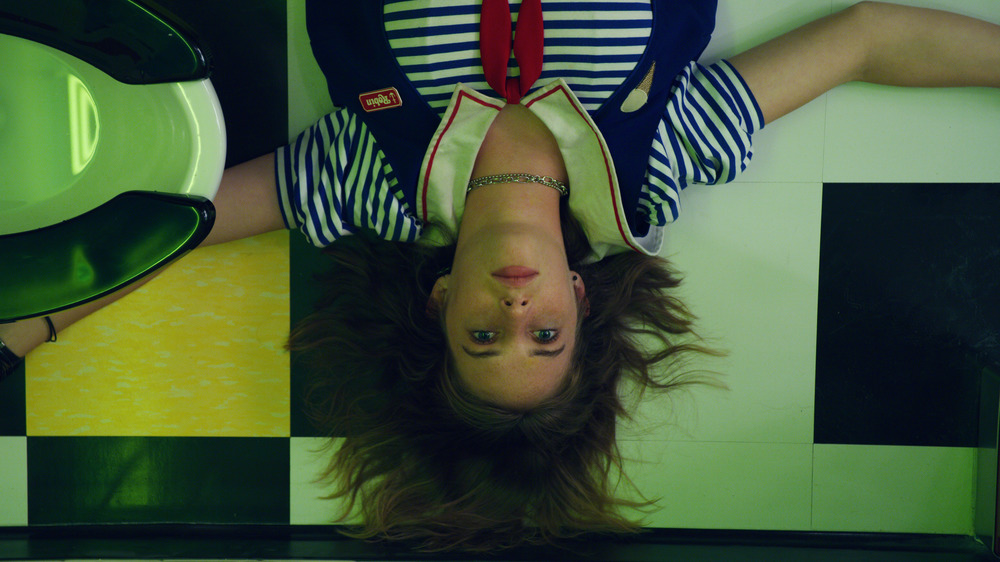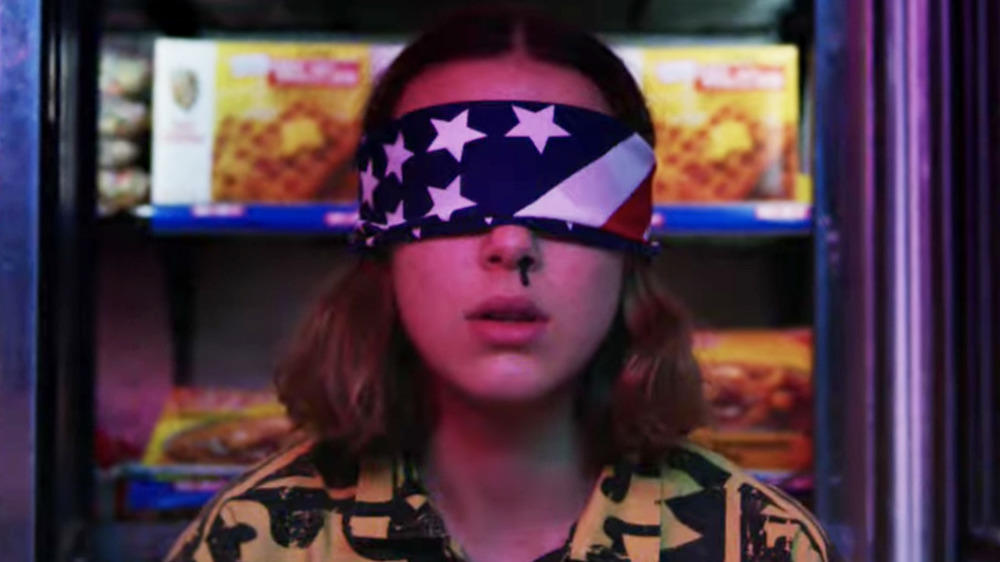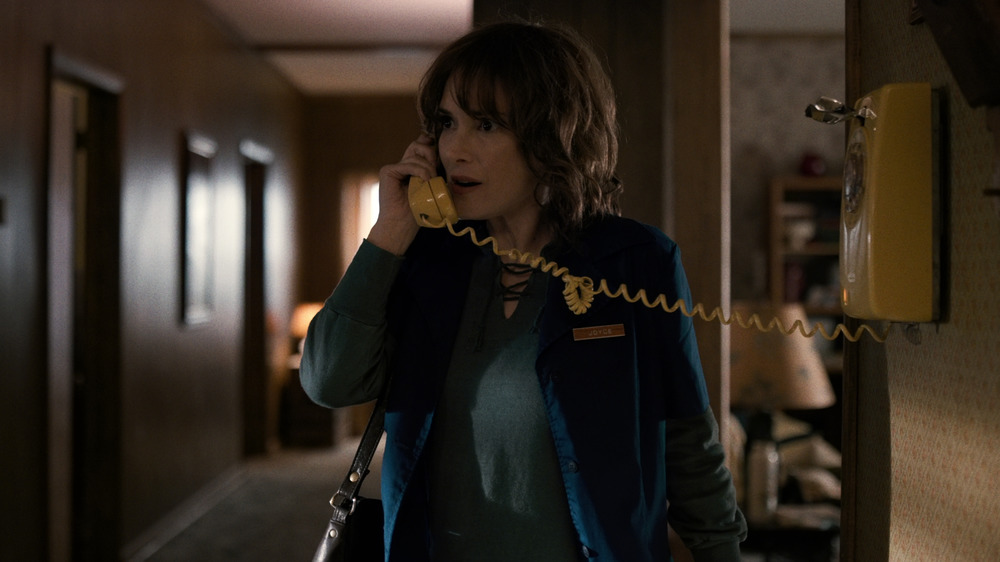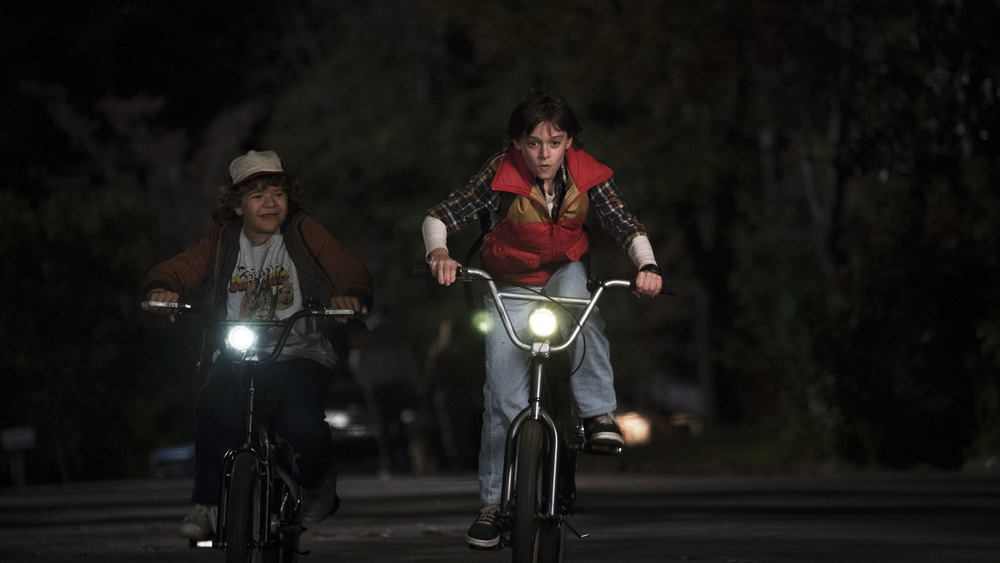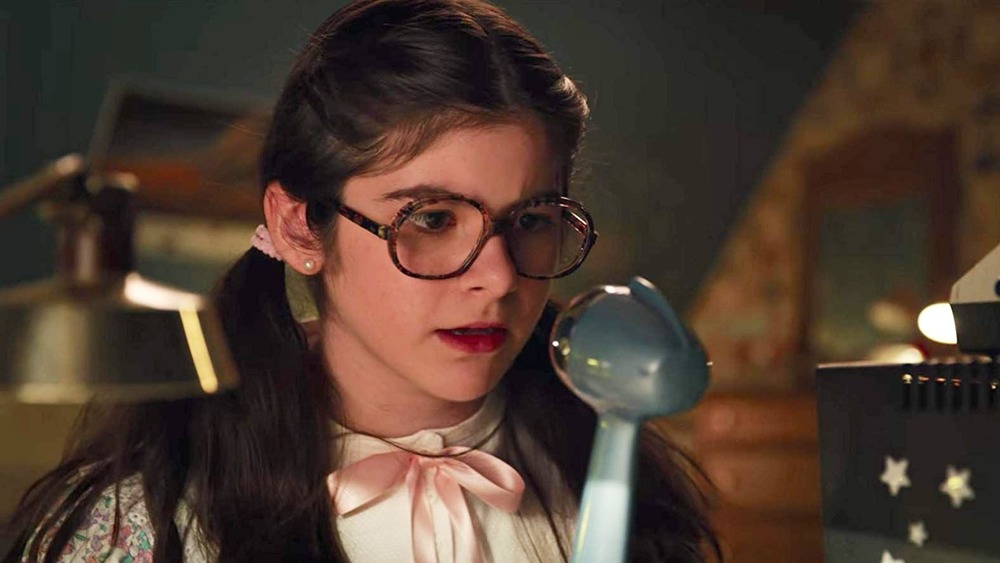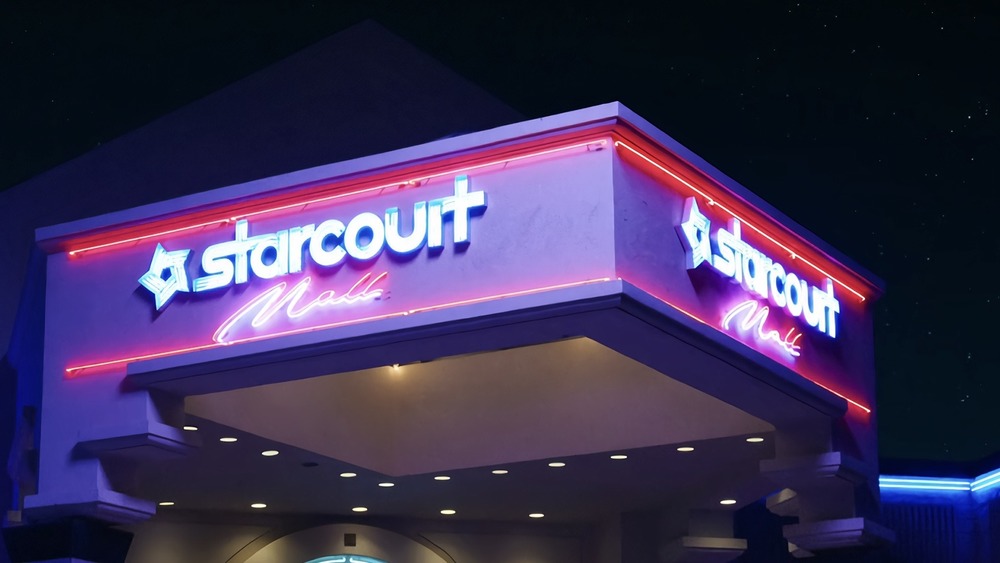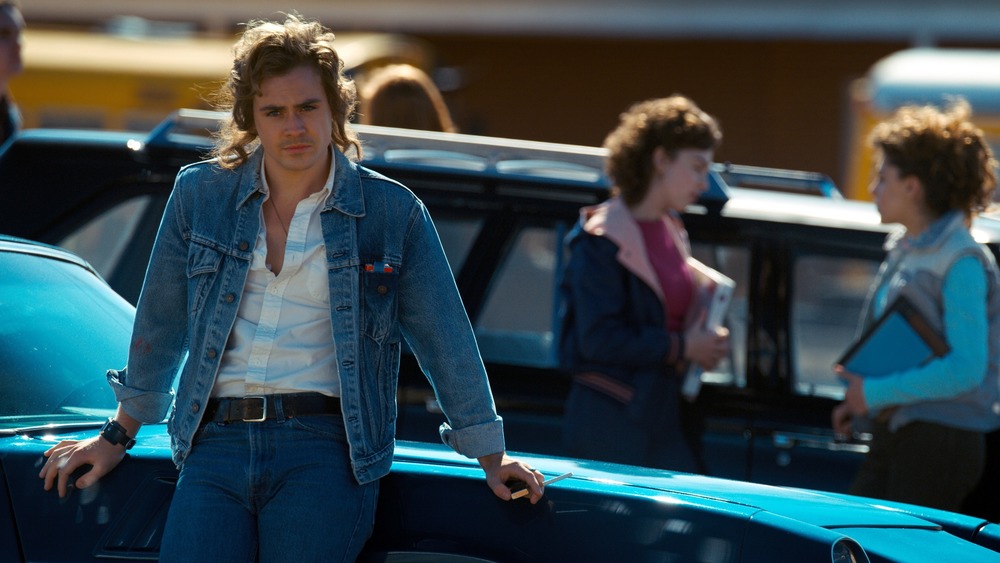Things Only Adults Notice In Stranger Things
Stranger Things is a show about kids that you might even mistake for a kids' show: a couple of middle-school and junior high kids star in a fantastical adventure interlaced with geek culture, aliens, evil governments, clueless parents, childhood friendships, and first romance. But grown-ups watching Stranger Things will notice a lot of details that might escape a younger eye.
Of course older people who were alive in the '80s would recognize many of the movie and TV references that the show's creators, the Duffer Brothers, string throughout the series. Still, even kids are pretty aware of the '80s classics; at the least, kids can find most of them pretty easily, and their parents probably already introduced them to the greats. But there are a lot of other details that older people would notice. In some cases, it's due to the fact that as one gets older and more experienced (theoretically), one becomes more responsible and starts looking more closely at "grown-up" things like health, politics, parenting and marriage.
For today's grown-ups, there is also the drastic contrast between the pre-computer era of youth (in some cases early youth) and the current connected world. There was a time before the Internet and playdates. Most grown-ups have lived through those dark ages, but can remember them all too well.
The Reaganite Wheelers
In Season 2 of Stranger Things, we see a Reagan campaign sign on the Wheelers' front yard. It's 1984 and Ronald Reagan, actor-turned-politician, would go on to win. President Reagan eventually became a Republican golden boy, known especially for his policy of lowering taxes for the rich in what would become known as "Reaganomics." From that sign we know the Wheelers are the stereotypical rich, Republican family of the '80s. Reagan was a somewhat divisive president, especially for families like the Byers, who as working class people did not fare well under Reagan's policies. Reagan's vice president, listed on the sign, was George H.W. Bush, whose presidency would close out the '80s.
Reagan was also fervently anti-communist, having crusaded against communism during his time as head of the Screen Actors Guild. As President he would become a vocal anti-communist warrior, which has obvious ties to the show. In one of his top speeches, Reagan's top implored Soviet Union president Mikhail Gorbachev to tear down the Berlin wall.
But Reagan definitely presented his battles against communism and his fiscal policy as being patriotic. And as Mr. Wheeler says while saluting federal agents when they're at his house looking for Eleven, "We're all patriots here" — even if as a patriot, his contributions to his country's protection pales in comparison to the actions of his children and their friends.
Hopper is a heart attack waiting to happen
At first glance, Hopper's just a likable, classic tough guy caricature. He drinks every night, not just a beer or two but drinking to the point that he's numb drunk. In season one of Stranger Things, his office knows every morning means coffee and quiet. Hopper rips cigarettes all day and regularly devours plates full of fried meats, at least when not downing a delightful combo of Eggo waffles, whipped cream, and candy. As a kid it seems funny how he eats like a slob, but as an adult you wouldn't be wrong to think the man is an alcoholic just a few terrorist fistfights away from a heart attack.
Hopper spends basically every day in Season 1 hungover. He doesn't get drunk as much in Season 2 — although he has a nightly beer, or three, or six. He's the kind of man who's likely never eaten a salad. Nor could one imagine him on a treadmill, though he has a pretty physical job filled with stresses and the occasional protracted fight with a Russian Terminator. While in the '80s it was still pretty acceptable to live off nothing but greasy meat, that wasn't a healthy way to live. Throw in Hopper's heavy drinking — who could forget in Season 3 when he drives home plastered to find El and Max hanging out — and you have a man who today would be considered on the edge of physical collapse.
Mr. Wheeler is a tragically detached father and husband
Mike and Nancy Wheeler are two of the most dynamic, interesting young people in Hawkins. Which makes it astounding that their father is as much of a detached non-presence as possible. He's completely oblivious to the fact that his children are both wrapped up in a multi-dimensional battle against a super-monster. So is Mrs. Wheeler, but eventually she seems to realize that something is up with her kids. By Season 3, we realize that there's more to her than meets the eye, and if anything she's simply been dragged down by her narcoleptic husband. Mr. Wheeler, despite all the drama revolving around them, never notices anything out of the ordinary, spending most of the time when he's at home sleeping (except for a speech about teamwork he gives to Mike).
Even more, Mr. Wheeler is a dud of a husband. At the end of Season 2, we see Mrs. Wheeler's jaw drop when Billy stops by while her husband is passed out in his easy chair, as always. By Season 3, we realize how unfulfilled Mrs. Wheeler is in her marriage when she makes plans to meet Billy at a motel, though she doesn't act on it. Mr. Wheeler is a tragically inattentive father and husband, a punchline in some ways, but in reality it's tragic that he's surrounded by so many people so full of life while he densely snores as it passes by.
Pricey radio toys
Yes, these kids are nerds, choosing to hang out in the Hawkins AV Club instead of the football field, and with basically no friends outside their group except their science teacher. In fact they may be the whole of the Hawkins AV club. For their public school to have a ham radio and AV club is certainly out of the ordinary. But nerds or not, they have some pretty expensive hardware. Their radios, the Radio Shack TRC-206, TRC-214 and TRC-219, weren't cheap. Plus Dustin has a headset and later builds Cerebro, a portable super-powerful radio, at science camp.
So while the prices of the radios aren't breaking the bank, the boys certainly have free rein to play with expensive toys and what is probably the most cutting edge technology at their schools. While their parents were likely more than happy to encourage their scientific side, their CB walkies and the hundreds of batteries they must go through in a year with their radios always on would make a pretty expensive outlay. And this is before everything had USB recharging.
"How was the pullout?"
Murray Bauman is the consummate matchmaker in Stranger Things, pointing out the sexual tension in two couples (both of which include a member of the Byers family). When Jonathan Byers and Nancy Wheeler come to him in Season 2 to get his help, the two teenagers sleep over after drinking a bit too much vodka. Bauman is surprised that they're not together and says they should just have sex, which they protest, with Jonathan saying he'll just sleep on the pullout. That night, Jonathan and Nancy can't sleep, thinking about each other, and when neither can hold out any longer they take their friendship to the next level.
The next morning at breakfast, Bauman asks "How was the pullout?" with a wry smile. A kid watching will think he's just joking about the fact that Jonathan Byers didn't sleep on the pullout sofa bed. A grownup, though, will see the double entendre he makes with the pullout sofa and a particular move that happens in the bedroom.
In Drugs Veritas
During interrogation, the Russians give Steve (Joe Keery) and Robin (Maya Hawke) a truth serum. The drug could be any one of a collection of drugs, but based on the reaction, at least to a grown-up, it is likely a psychoactive drug. It should be added that MK-Ultra, the program that gave rise to Eleven's psychic powers, was known in the real world to experiment with hallucinogenics and psychology mainly as an aid in interrogation. When Steve and Robin start laughing and joking with each other, to kids they seem drunk; but adults will know they're tripping.
How much they love Back to the Future, truly a mind-blowing experience on hallucinogens, leads Steve to list it as one of his favorite movies when he interviews to work at a video rental. While sitting outside the theater, the lights on the ceiling of the mall begin to send off chasers for Robin and Steve. That lands them in the bathroom, throwing up and then having one of the greatest heart-to-hearts in Stranger Things history. In the end, most adults will notice these two were dosed with some strong psychoactive drugs, which makes Steve's quick recovery and ability to drive a car even more astounding.
Happy Holidays
Each season of Stranger Things centers around a holiday, with the seasons grounded by that particular celebration and Netflix releasing each season in conjunction with that holiday. Christmas in Season 1; Halloween in Season 2; 4th of July in Season 3. This might seem like an arbitrary choice but nothing in Stranger Things is arbitrary. Almost everything has a connection to '80s culture, and while kids might not understand, adults remember how important these holidays were to every movie or TV show back then.
There are still Christmas movies but they don't feel as grand as they used to be, nor as central to mainstream culture. Some shows still have specials around a holiday, but in the '80s every show had a Christmas special and a Halloween episode. There don't even seem to be movies or TV episodes centered around the 4th of July anymore, but in the '80s they were everywhere, often set in small towns around summer break. Life and media used to be a hop from holiday to holiday.
The corded phone
There is no way to explain how it was to have one phone in the house, connected to the wall by a cord. Younger people will never understand having to take a phone call standing in the kitchen, in front of anybody else who wants to listen, because the phone was mounted on the wall next to the kitchen. We see the phone in the Byers home in season one, mounted on the wall and holding Joyce Byers glued to it. And for the grown-ups who mostly remember it, the central shared phone brings back conflicted memories.
Yes, there was something nice in not being accessible at all moments. But it hindered mobility and privacy. Sometimes that short cord was replaced by a long one you could stretch into any room in the house. Except it was easy to figure out when it was a private call. And even if you were in another room, you could never guarantee the call was private — as evidenced when Mrs. Wheeler picks up the other phone to listen to Mike's call with El and is shocked at his lie that his grandmother is sick.
Free range kids were the norm
As an adult in the era of playdates, constant chauffeuring, and stranger danger, it can be shocking to be reminded of a time when parents let their kids go off on their own all day. Yet the kids of Stranger Things bike around by themselves from house to house, over what is likely miles of empty roads, at 12 years old. Lucas's younger sister in Stranger Things, Erica, is left completely unsupervised at the mall at age 10 in Season 3. Her parents don't even seem to notice that she spends basically a day in a Russian bunker.
In the '80s, kids were mostly left to their own devices. They made friends on their own, biked to their houses by themselves, and their parents let them take care of themselves most of the day. Sure, that lack of supervision led to Will being snatched by the Demogorgon and from that point on Will's brother was assigned to surveillance duty. But that also allowed the kids to figure out what was going on and save him, and eventually the town, without parental intrusion.
A disconnected world
The old world was so disconnected compared to our present world, which adds a lot to Stranger Things. Only grown-ups will fully notice and remember how disconnected it was. How many times is everybody separated and looking for each other in Stranger Things? If they had cell phones, they could call each other to figure out where the other one is. Yes, the kids do that with their walkies but as we see in Season 2, they don't always have their walkies on them, while the modern connected world is always cell phone accessible. Many parents have GPS trackers on their kids' cell phones but in the series there is no easy way to figure out where your kids are.
In Season 1, we see how long Hopper and company have to spend going through microfiche to find out that HNL was involved with MK-Ultra. In Season 3, when the group doesn't know Planck's Constant, they have to get Dustin to connect to his brainiac girlfriend, Susie, in Salt Lake City using his super powerful radio because she is the only person they know who knows Planck's Constant. With the Internet you can look up Planck's Constant in half a second. Incidentally, a quick search shows that it's 6.62607004 × 10-34 m2 kg / s, a measure of electromagnetic action and therefore another reference to electromagnetism buried in the series.
The Starcourt Mall is king
In Season 3 of Stranger Things, we see the impact that the Starcourt Mall has had on the small town of Hawkins, Indiana. Before malls, people walked through downtown areas, going to random shops and — in bigger cities — department stores. But shopping was mostly about independent shop owners and locally-owned stores, or sometimes mail order. Then malls brought in chains owned by far-off conglomerates, and while everybody protested the death of downtown districts (as happens in Stranger Things), the malls became a central point of American culture. They started in big cities but quickly spread to smaller towns.
Many grown-ups have memories from earlier in their life when they would go to the mall and spend a few hours walking around, shopping, catching a movie, and eating at the food courts. It was a deeply-ingrained part of American culture for a few decades. Then online shopping came and now the malls are lamenting their demise as they're replaced by e-retail. Ironically, buying local at downtown shops (or online from local shops) seems to have made a great resurgence. Kids today may never understand how, for a brief while — from Dawn of the Dead to Clueless to, of course, Mallrats – malls were king.
Product placement
In Season 2 of Stranger Things, Steve and Nancy go to the home of Barb's parents to talk about her disappearance. The parents can't get it together to cook so they order KFC for dinner. Joe Keery, who plays Steve Harrington, spouts ad-worthy lines about the finger-lickin' good chicken. Adults, who grew up with overt product placements (and who perhaps remember the references to product placement in such classic movies as Wayne's World), would likely notice it. Brands in storylines were a constant since TV evolved as a machine driven solely by ad revenue, though they were eventually replaced by more expensive commercials and then subscription payments.
Another product placement a grown-up would notice? New Coke. Lucas sounds like a commercial as he pontificates to his friends on the quality of New Coke. In 1985, New Coke was Coke's attempt to revitalize its brand and Lucas's description sounded like perfect advertising. Coca-Cola even reissued "New Coke" as a tie-in to the show. So Stranger Things has used an old marketing trick in a tongue-in-cheek way to bring old-world marketing to the world of TV without pricey commercials.
Moving from California to Indiana as a teen in the 80s would have been horrible
California may have lost some of its luster given the growth of other cities and the high cost of living in Cali. But in the '80s, California was everything. While Chicago enjoyed popularity thanks to John Hughes and New York has always had a strong presence, many movies and TV shows about adolescence in the '80s were set in California, a good proportion of them in L.A. County from the beach to the Valley. In many ways, the trends set in California trickled to the rest of the country, as evidenced by Lucas and Dustin repeating "totally tubular" to Max.
This was the era before social media and online shopping, when the only way to know the trends was to be in the epicenter. So to leave that would be almost like falling back in time. Small towns could be a season, a year, or more behind the trends. Billy is infuriated by this, though his status as a guy from California gave him instant cachet in Hawkins.
So leaving the center of the youth world for someplace else would have hit harder in 1984 than almost any other time in history and a person can almost understand Billy's frustrations. But it also made it possible for the events of Stranger Things to progress the way they do, without the spotlights of the world focused on sleepy towns.
